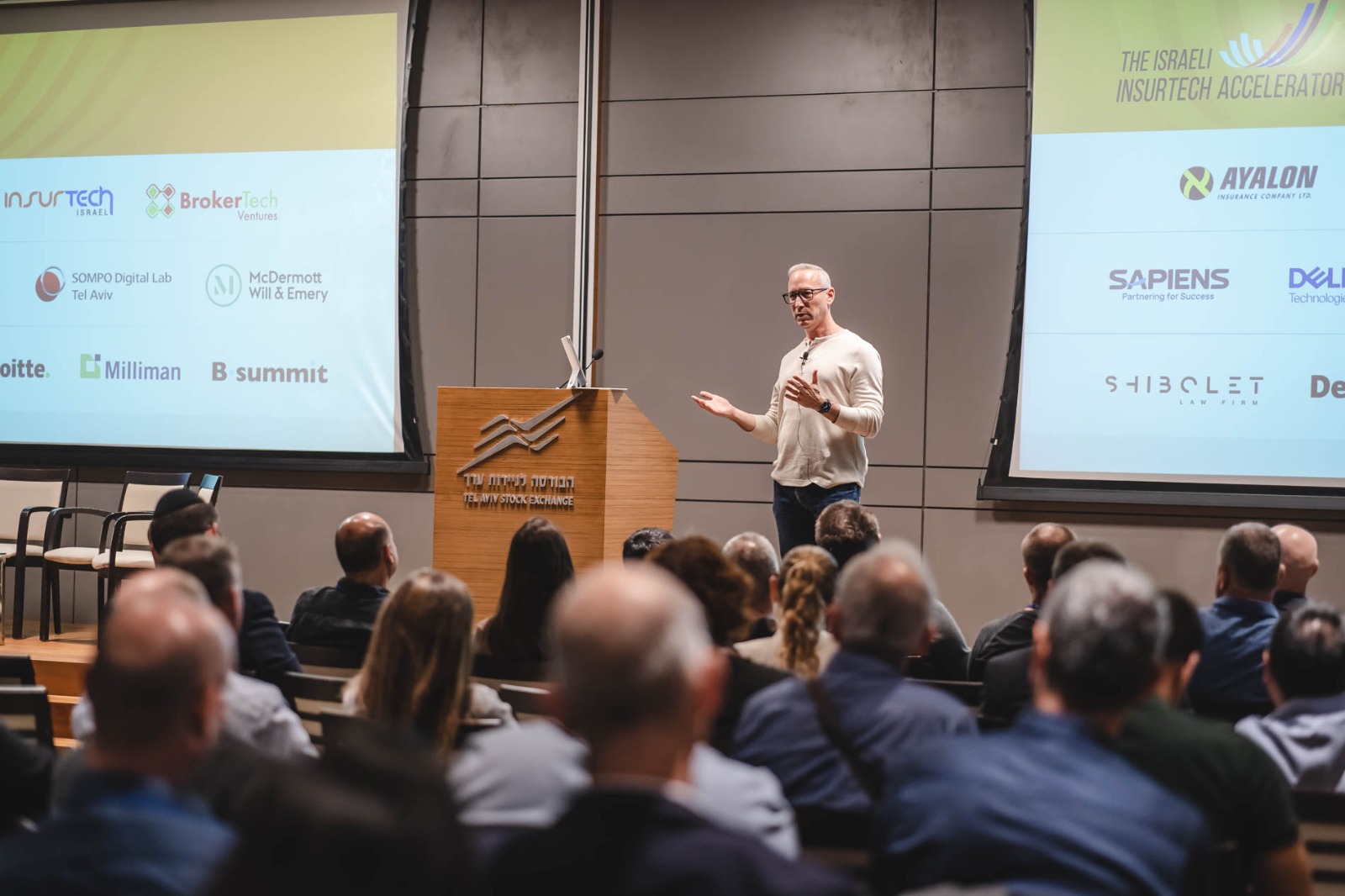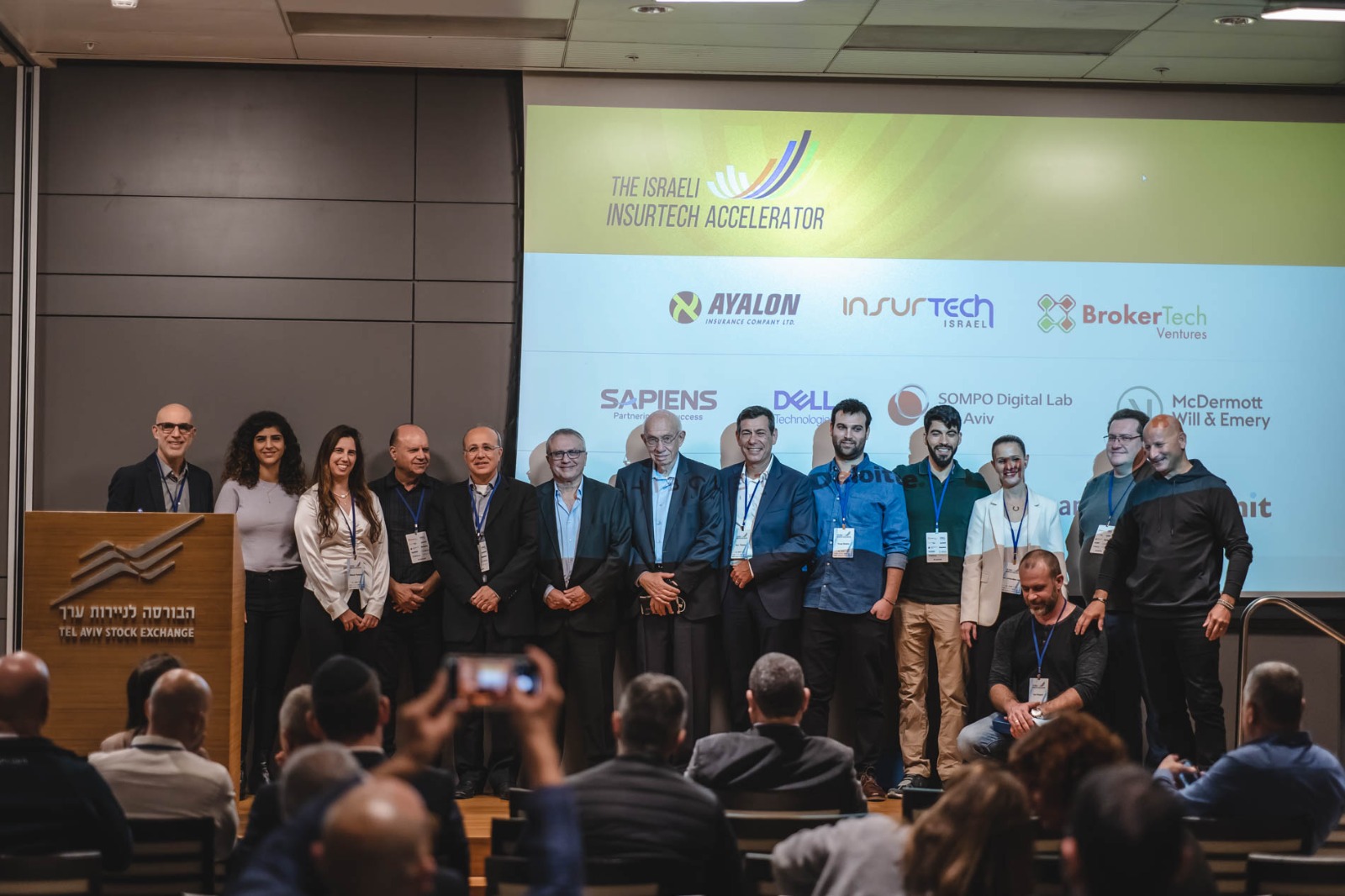Accelerator professional director Kobi Bendelak: During the two sessions, the start-ups raised over 40 million dollars * Lemonade founder Saniel Schrieber, at the event: the insurance companies have lost their lead of the foundation stone of the industry – data and statistics
The second session of the Israeli insurtech accelerator, which was held on the initiative of the Ayalon insurance company and Insurtech Israel ended last week with an event with the participation of, amongst others, Insurance Commissioner Dr Moshe Bareket, Ayalon seniors including Chairman Dr Avigdor Kaplan and CEO Arik Yogev, Insurtech Israel CEO Kobi Bendelak, Lemonade founder Danny Schrieber and tens of entrepreneurs in the insurtech sector. Also participating were Ayalon Headquarters Innovation and Human Resources Division Manager Roni Lichtenstein-Shani and Ayalon Information Systems manager Shlomo Shamai, who led the accelerator from the Ayalon end.
Four insurtech companies took part in the accelerator’s second session:
- Urbanico – which is developing a system that is able to gather urban data at a high level of accuracy in order to enable insurers to deploy for carrying out higher quality underwriting in elementary insurance.
- Emnotion – which has developed a system for long term forecasting of climate change and natural catastrophes, assisting insurance companies in underwriting and damage prevention.
- Covary – which has developed an innovative platform for mutual guarantee based life and health insurance.
- Psyber – which is involved in cyber and providing protection and underwriting for insurance companies in the cyber area.

Lemonade founder Daniel Schrieber
Partnering in the accelerator, alongside Ayalon and Insurtech Israel: BrokerTech Ventures, and also the Alifim and Tikotzki insurance agencies, and insurance, finance and technology giants including Milliman, Deloitte, Sompo, Sapiens and Dell.
Accelerator professional director Kobi Bendelak: “Tel Aviv, although regarded as one of the world’s insurtech capitals, did not have an accelerator of any kind to accelerate or support the Israeli insurtech companies. We decided to do something about this and set up the Israeli insurtech accelerator here in Tel Aviv.
“The traditional insurance companies are in competition with other traditional insurance companies, but also with new players entering the sector. This requires them to cope with a far bigger challenge – of making the digital change within themselves. The insurtech industry is the engine for this historic change.
“The accelerator’s first and second round saw the creation of a group of amazing entrepreneurs at different stages. From a startup which raised 30 million dollars in Round A capital to companies which raised only a small amount of seed capital. During the two sessions, the startups raised over 40 million dollars. It looks like something good is happening here”.
Ayalon CEO Arik Yogev: “The end of the first session was exciting, but the second session has fixed the accelerator as a factor in the international insurtech industry and taken it from being just one more initiative to being a process for change. When we decided to initiate the accelerator we set ourselves two goals:
- To expose Ayalon to new startups with technologies that could be of use to it.
- To create a pioneering initiative to assist in driving forward the insurance market and insurtech sector in particular.
“We have attained these two objective earlier than expected, with, amongst other things our assimilation of some of the solutions of first session participating companies, and we are pleased that other companies are following in their footsteps”. Yogev referred positively to the accelerator’s professional director, Insurtech Israel CEO Kobi Bendelak – “I am full of admiration for his initiating and management capabilities”.
Yogev related to the transfer of control of Ayalon and announced his retirement: “Six years as CEO is almost an eternity, a full world of action. One of my most important tasks was to take a traditional insurance company and create a cultural change. Ayalon speaks this language, hold hackathons and succeeds in involving tens of workers who contribute their thinking. And we are implementing. The accelerator is the crown of innovation at Ayalon”.
During the main lecture at the event, Lemonade founder and CEO Daniel Schrieber, said that the insurance world has extraordinary potential for technology, which is not fully appreciated. He said that technology is of value in all areas, but it sometimes surrounds the product without touching it: “In insurance, the technology product is different. Insurance companies have been around for 200-300 years, and this did not just happen. This is the time when the law of probability was developed. This was a new and exciting technology, and the insurance companies controlled it. But the insurance world has lost its control of the foundation stone of the industry – data and statistics. The insurance companies have controlled it for 300 years, but they have lost the lead and this is an opportunity for startups”. Schrieber related at length to the phenomenon of insurance fraud. He said that the phenomenon is one that amazes him: “People are law abiding, but this all changes with regard to insurance companies. We defraud the insurance companies shamelessly. This is amazing. Why does it happen”?
He said that wherever it is possible to slightly hurt a large group of people and profit at their expense, this will in all probability happen – in the beginning with a single player, afterwards with a few players and in the end everybody becoming involved. As a result Lemonade developed a model according to which 25% of the premiums reach the company, and all of the rest is used for paying claims and the balance is donated – “the conflict of interests is weakened. This is no longer a game of two players, but three – the insurance company, the insured and the donation. We do not profit from refusing to pay a claim and the company does not profit from fraud’.
At this point, Schrieber related to what he calls the “startup paradox”: “Insurance companies know perfectly well what they are doing. Anyone who thinks he can do 10% better will in all probability fail. But whoever tries to do it ten times better has a good chance of succeeding”. This, according to Schrieber, is like the possibility of beating Kasparov at basketball, since there is no way of beating him at chess. “When trying to do it ten times better, this forces us to think about the game in a new way. Not change and improve at the margins, but build something new”.
Insurance Commissioner Dr Moshe Bareket said that he regards the insurtech industry as the future of the insurance sector: “Insurtech, whilst coming from young companies, but will be swallowed up by the big corporations. The insurtech companies will grow only if they have the patience to become insurance companies. This is the business. It is not enough to provide value to an insurance company.
“We are looking for what will feed the machine. You need to have the ability to come and receive what is needed in order to become significant businesses – money with a long term commitment”, said Bareket and added that he intends approving in the Knesset investment of 50-60 billion dollars by the institutions in fintech: “But the money never comes easily, a successful business model needs to be built. Creating the technology is not enough, a business of significant size needs to be built”.
The potential model presented by Bareket is for money from the worlds of technology reaching the insurance sector: “I look forward to the day when the new money starts entering the Israeli insurance market. We are seeing this in banking with the investment in digital banking. I look forward to the day when hi-techists will start acquiring Israeli insurance companies”.




